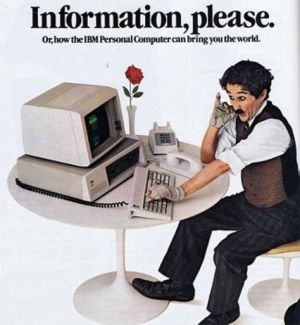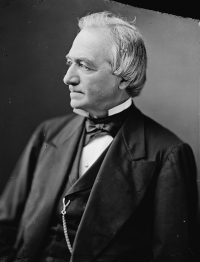
If he doesn’t win, America and the world have a bigger problem, one I don’t think we can overcome. So, let’s assume the world goes on for a moment.
Joe’s solar problem is something the computer industry faced around the time when I was becoming a reporter, in the late 1970s. Until then, computers were capital goods. They were either leased or purchased over time with loans. Even my first PC purchase, in 1982, was with a loan.
Loans and leases built a business model that was smashed by the PC era. Both loans and leases carry huge external costs and margins. My Massapequa neighbors had nice houses and cars. Their fat sales or engineering salaries were paid for by IBM customers, who compared the cost of having IBM handle their problems to the cost of doing things manually and signed their names to lines that were dotted.
In 1981 IBM didn’t just start selling a PC. It became a computer products company. It licensed the likeness of Charlie Chaplin, who had died in 1976, from his estate. It used the rose he offered his amour in City Lights, painting it a bright red. Then it distributed the PC through computer stores, who placed it on shelves alongside the printers and other peripherals. By the 1990s you wouldn’t think of hiring a “computer specialist” to sell you stuff, unless we were talking about a networking expert who got his own hands dirty.

Right now, America’s solar industry is stuck in 1975, and this has driven panel production offshore. Solar stocks are rising, in anticipation of a Biden win, but the companies they work for are about to circle the drain. Solar leases are stupid, because you’re committing to something for 10 years that won’t be economically viable in 5, any more than your iPhone 3 is worth hanging on to.

None of today’s solar or wind players are ready for this revolution. It’s a complete change from what we’re used to. Devices that don’t need to be plugged in, grids that are dependable on the level of a few blocks, using excess power from homes that invest in batteries to power those which don’t. Today’s utility companies, even forward-thinking ones like Next Era Energy (NEE), will become back-ups.
The best way to manage this transition is not to throw money at it. Better to do what Biden himself did with cancer five years ago. The Cancer Moonshot took an open source approach. It convinced researchers to share their discoveries, cash for the research in exchange for the sharing.
An open source approach, in which new discoveries produced by American scientists are pooled and made available to anyone who will produce them, can get us to the renewable energy future much faster than any big government program. This can also be applied to other areas where climate change threatens to destroy us unless we cooperate.

This is how you get to the future. You do it from the bottom up, making renewable power a consumer product, and energy harvesting a standard. You do it from the bottom up, making new discoveries open source.
NextEra Energy, which has made a business model from harvesting their energy and re-selling it through electric utilities, is now worth more than Exxon Mobil. But the future is only just getting started, and many business models will die along the way. ComputerLand says hi.










